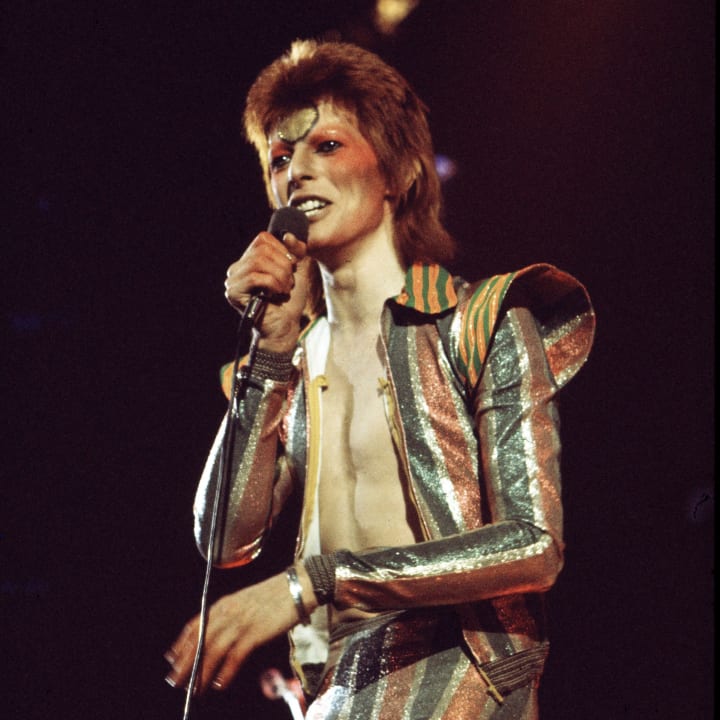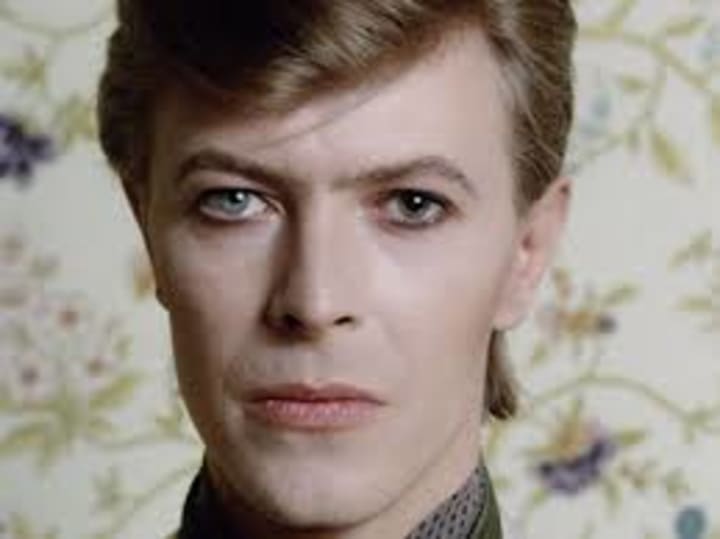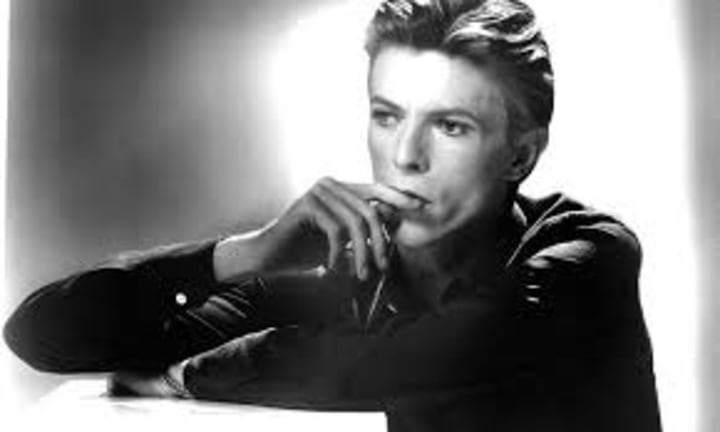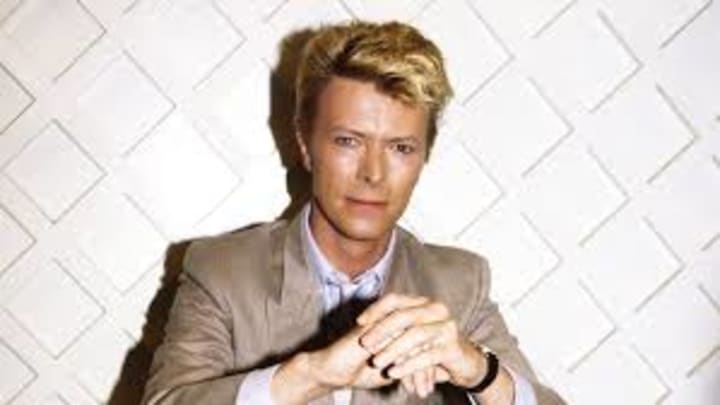DAVID BOWIE
"What I like to do is try to make a difference with the work I do"

He was awarded 10 platinum album certifications. 11 gold and 8 silver in the U.K. He released 11 number-one albums. He was inducted into the Rock and Roll Hall of Fame in 1996. He has been placed among the 100 Greatest Artists of All Time and was called the “Greatest Rock Star Ever” following his death in 2016. He was David Bowie!
David Robert Jones was born in Brixton, London, on 8th January, 1947. His mother was Margaret Mary ``Peggy” and his father was Haywood Stenton “John” Jones, who worked as a promotions officer for the children’s charity Bernardo’s. The family lived in a house in Stansfield Road, which is on the boundary between Brixton and Stockwell in Lambeth. David attended Stockwell Infants School until he was 6 years of age --- “a gifted and single-minded child --- and a defiant brawler.”
The family moved around, finally settling in Sundridge Park in 1955 where David attended Burnt Ash Junior School. His voice was good enough for the school choir and David played the recorder well. His teachers were impressed with David’s dancing calling it “vividly artistic” --- his poise was “astonishing” for a child. David’s father brought home a collection of American 45s (‘small records’ for the younger generation who may be reading this) by artists The Platters, Elvis Presley, Little Richard (and many more), which ‘fueled’ David’s love for music. When hearing “Tutti Frutti” by Little Richard, David said that he had “heard God.”
The following years, David took up several musical instruments, and at the same time, he and his cousin, Kristina, used to “dance like possessed elves.” John encouraged his son to follow his dreams and took David to meet singers and performers who were preparing for the Royal Variety Performances (Alma Cogan / Tommy Steele / etc). After taking his 11+ exam, David went to Bromley Technical High School. This was an unusual school. With emphasis on languages, science and design --- and the arts. David studied art, music and design (including layout and typesetting). With his introduction to modern jazz, his mother gave David a Grafton Saxophone (1961) and he received lessons from Ronnie Ross.
In 1962, David had a serious injury at school, and after having several operations, his left-eye could not be fully repaired. “The eye later became one of Bowie’s most recognizable features.”
David’s first band was “The Konrads'” (1962), David being just 15 years of age. The group played guitar-based rock and roll at local youth gatherings and weddings. Upon leaving school, David told his parents that he was going to be “a pop star!” However, his mother arranged for David to work as an electrician’s mate.
Wanting to further his career, David left The Konrads and joined “The King Bees”. Leslie Conn began to promote David, his debut single was “Liza Jane” and it was credited to Davie Jones with The King Bees --- it was not commercially successful. David was not satisfied and left The King Bees to join “The Manish Boys: “I used to dream of being their Mick Jagger” said David. Not being successful with this band, he moved on to join “The Lower Third” but they also were not successful and Conn ended the contract. After joining several other bands, all of which were not successful for David, Kenneth Pitt took over as David’s manager.
David changed his stage name to “David Bowie '' (after the 19th Century American pioneer James Bowie), he now made his first album. It was an ‘amalgan’ of pop, psychedelia and music hall and called “David Bowie '' but it failed to hit the charts.
David now studied the dramatic arts --- from avant-garde theatre to mime and commedia dell’arte --- and he immersed himself in building a new ‘peronae.’ Joining the group “The Feathers”, David and the group did a small number of concerts which combined folk, poetry and mime.
Again, David left this group and moved in with Mary Finnigan as her lodger. On 11th July, 1969, he released “Pace Oddity” and it reached the top five in the U.K. The song was released a few days ahead of the Apollo 11 launch. Bowie now joined forces with Finnigan, Christine Ostrom and Barrie Jackson to run a folk club on Sunday Nights at the Three Tuns Pub (Beckenham). The club was influenced by the Arts Lab movement, becoming the “Beckenham Arts Lab” --- and it was extremely popular! The Arts Lab hosted a free festival in a local park and this was the subject of Bowie’s song “Memory of a Free Festival.”
His second album “Space oddity” featured “philosophical post-hippie lyrics on peace, love and morality.” It was not a commercial success at the time.
In April, 1969, David met Angela Barnett and they married within the year. Her influence on him was far-reaching, especially on David’s career. After a difficult time with the band and disastrous gigs, David fired his manager, Pitt, and replaced him with Tony Defries.
Bowie’s third album was released in 1970 --- “The Man Who Sold The World” --- and it moved on to a more hard rock sound. Mercury Records financed a publicity tour, in which Bowie was interviewed by radio stations and the media. The original U.K. cover showed Bowie wearing a dress, so he wore the garment during interviews. John Mendelsohn (from the Rolling Stones) described Bowie as: “ravishing, almost disconcertingly reminiscent of Lauren Bacall.” David Bowie was now beginning to be noticed by the Music Industry.

During the tour, Bowie noticed Iggy Pop with the music of Lou Reed and “Ziggy Stardust” was born. When he returned to England, Bowie made his intentions known” to create a character who looks like he’s landed from Mars.” The surname “Stardust” was a tribute to the “Legendary Stardust Cowboy.”
On 10th February, 1972, Bowie launched Ziggy Stardust. Dressed in a striking costume, he did a stage show with “The Spiders From Mars” at the Toby Jug Pub in Tolworth (Kingston-Upon-Thames). The show was a success and Bowie was “catapulted” into stardom when he toured the U.K. over the next six months --- a ‘cult of Bowie’ was created --- which has lasted (perhaps) longer than anything else in the pop industry. The album “The Rise and Fall of Ziggy Stardust and the Spiders from Mars” was released in June, 1972. “Starman” the single had been launched in the April before. Both album and single hit the charts and Bowie performed on Top of the Pops in the July. The album remained in the charts for two years and the “Ziggy Stardust Tour” continued into the United States.
The album “Aladdin Sane” (1973) topped the U.K. chart and it was Bowie’s first number-one album. Bowie’s love for acting saw him totally immersed in the character: “Offstage I’m a robot. Onstage I achieve emotion. It’s probably why I prefer dressing up as Ziggy to being David.” (Bowie’s own words). This became dangerous because Bowie could not separate “David” from “Ziggy” and his whole personality was affected. Bowie started to doubt his own sanity, especially as schizophrenia was in the family with his half-brother, Terry, living alternately at home and in psychiatric wards. Bowie’s later “Ziggy” shows were ultra-theatrical affairs with ‘shocking stage moments.’ He toured and gave press conferences as “Ziggy” before a dramatic “retirement” show at London’s Hammersmith Odeon on 3rd July, 1973.
Bowie left the group “the Spiders From Mars” and attempted to move on from “Ziggy.” He released the novelty record (from 1967) “The Laughing Gnome” which reached number six.

In 1974, Bowie moved to America, settling in Los Angeles. His next ‘project’ was “Diamond Dogs” which was a musical and its music moved towards soul and funk. The album went to number one in the U.K. and number five in the U.S.A. To launch the album, Bowie went on the “Diamond Dogs Tour” and visited cities in North America between June and December, 1974. Unfortunately, Bowie’s use of cocaine now slid into an addiction which produced severe physical debilitation, paranoia and emotional problems. The next album “David Live” solidified Bowie’s status as a superstar although Bowie himself said that it should have been called “David Bowie is Alive and Well and Living Only in Theory.” The album reached number two in the U.K. and number eight in the U.S.A. Bowie now had a break in Philadelphia (where he recorded new material) and then resumed the tour with a new emphasis on soul music.
The “Young Americans” was released in 1975 and this became Bowie’s number one in the U.S.A. His work “Fame” was co-written with John Lennon, who added the backing vocals. However, Bowie was still existing “on loose change.”
“Station to Station” introduced Bowie’s new persona --- “The Thin White Duke.” Whilst taking an interview with Russell Harty (London Weekend Television), Bowie was incoherent and “disconnected” --- his cocaine addiction was getting out of hand. By his own admission, his sanity had become twisted by the cocaine. Bowie overdosed several times during this year and was physically withering away “to an alarming degree.”
The “Isolar Tour” (1976) was highly successful and lasted for three and a half months through Europe and North America. Yes, the tour was successful but also mired in political controversy. He was detained on the Russian / Polish border for possessing Nazi paraphernalia. It seemed that his addiction to cocaine had “motivated these controversies.” Whilst waving to the crowd, Bowie made a gesture “like” a Nazi salute. After recovering from drug addiction, Bowie apologized.

Bowie now moved to West Berlin to clean up and ‘revitalize’ his career. He shared an apartment with Iggy Pop and was often seen riding his bicycle between the apartment and the recording studio. During this time, Bowie focused on minimalist, ambient music for the first of three albums which became known as the “Berlin Trilogy”, co-producing them with Tony Visconti.
The album “Low” (1977) was a more abstract musical form in which lyrics were sporadic and optional. The record company was nervous about the album and released it three months later. They were right to be careful as the album received considerable negative criticism. Still, the album reached number two in the U.K. The composer Philip Glass described “low” as “a work of genius” (1992). In 1977, “Starting Point” was released --- a 10-song LP containing releases from Bowie’s “Deram” period (1966-1967).
The second of the trilogy “Heroes” (1977) incorporated pop and rock to a greater extent. “Heroes” evinced the zeitgeist (the spirit of the age) of the Cold War, symbolized by the divided city of Berlin.
Towards the end of 1977, Bowie joined Bing Crosby in “Peace on Earth / Little Drummer Boy” which five years later proved a worldwide seasonal hit, hitting the charts in the U.K. at number three on Christmas Day in 1982.
Having broken his drug addiction, Bowie toured again, the “Isolar II World Tour”, which brought his music to almost a million people during 70 concerts in 12 countries!
The final part of the trilogy “triptych” --- “Lodger” (1979) was a result of a complex mixture of new wave and world music. The album was recorded in Switzerland and it was called “Bowie’s Sergeant Pepper.” “Lodger” reached number four in the U.K. and number twenty in the U.S.A. Bowie and his wife, Angie, divorced in 1980.
In 1981, Bowie paired with Queen for a one-off single “Under Pressure”, which was a hit and became Bowie’s third U.K. number-one single. He reached his peak of popularity and commercial success in 1983 with “Let’s Dance.” Bowie had now emerged as one of the most important video artists of the day. “The Serious Moonlight Tour” began in 1984, which lasted six months and was extremely popular. At the 1984 MTV Video Music Awards, Bowie received two awards including the “Video Vanguard Award.”
If I went on with David Bowie’s achievements, you’d be reading for another 3 hours! He is one of the most well-known pop stars of this century --- young and old know his name. It is quite something when we remember that David was still bringing out albums at 66 years of age. At the Annual Grammy Awards (2017) Bowie won 5 awards!

David died on 10th January, 2016. What comes across to me personally, is that David Bowie was always ahead of his time --- in his personality --- and his music!
About the Creator
Ruth Elizabeth Stiff
I love all things Earthy and Self-Help
History is one of my favourite subjects and I love to write short fiction
Research is so interesting for me too
Enjoyed the story? Support the Creator.
Subscribe for free to receive all their stories in your feed. You could also pledge your support or give them a one-off tip, letting them know you appreciate their work.






Comments
There are no comments for this story
Be the first to respond and start the conversation.